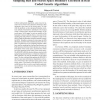Free Online Productivity Tools
i2Speak
i2Symbol
i2OCR
iTex2Img
iWeb2Print
iWeb2Shot
i2Type
iPdf2Split
iPdf2Merge
i2Bopomofo
i2Arabic
i2Style
i2Image
i2PDF
iLatex2Rtf
Sci2ools
104
click to vote
GECCO
2000
Springer
2000
Springer
Sampling Bias and Search Space Boundary Extension in Real Coded Genetic Algorithms
In Real coded genetic algorithms, some crossover operators do not work well on functions which have their optimum at the corner of the search space. To cope with this problem, we have proposed boundary extension methods which allows individuals to be located within a limited space beyond the boundary of the search space. In this paper, we give an analysis of the boundary extension methods from a view point of the sampling bias and perform a comparative study on the effect of applying boundary extension methods, namely the BEM boundary extension by mirroring, the BES (boundary extension with extended selection). We were able to confirm that to use sampling methods which have smaller sampling bias had good performance on both functions which have their optimum at or near the boundaries of the search space, and functions which have their optimum at the center of the search space. The BES/SD/A (BES by shortest distance selection with aging) had good performance on functions which have the...
Related Content
| Added | 24 Aug 2010 |
| Updated | 24 Aug 2010 |
| Type | Conference |
| Year | 2000 |
| Where | GECCO |
| Authors | Shigeyoshi Tsutsui |
Comments (0)

